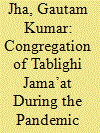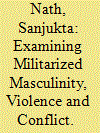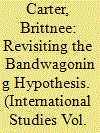| Srl | Item |
| 1 |
ID:
185156


|
|
|
|
|
| Summary/Abstract |
Recently, the national and international media have cast Tablighi Jama’at (TJ)’s image and its members as the potential vectors for spreading the COVID-19 coronavirus globally. The media coverage also became significant as the TJ cast off the government’s advice to adjourn the congregation organized during the initial stage of spreading the virus in India, Indonesia and Malaysia and instead decried the government for interfering in its religious meetings and practices. The article discusses its ideological roots in various Islamic revivalist movements and activities inspired by pan-Islamic trends. TJ and its dogmatic ideological base are responsible for re-Islamizing a large section of lower and lower-middle-class Muslims. TJ calls for fellow Muslims to follow the puritanical form of Islamic practices to establish an Islamic state based on Sharia. The article also highlights that TJ’s conscious racial ghettoization efforts have resulted in an anomalous society, jeopardizing social harmony.
|
|
|
|
|
|
|
|
|
|
|
|
|
|
|
|
| 2 |
ID:
185154


|
|
|
|
|
| Summary/Abstract |
The article analyses how masculine social norms shape the idea of survivors/victims in International Politics. It will conceptually analyse how masculine social norms have been normalised through militarism and militarized masculinity in international politics. In this process, it will locate how international politics has conceived male survivors of sexualised torture. It will use a gender lens in understanding the discourse and practice of torture in armed conflicts. It argues that there exists a gender-based binary in the way victimhood in conflict situations has been perceived in international politics where victims are generally seen to be women and the perpetrators are men. It uses a critical feminist perspective in problematizing the essentialist gender-based binary between victims and perpetrators of violence particularly sexual and gender-based violence. There exists silence in international politics in the ways that male victims of sexualised torture during conflict situations have been perceived in international politics. This silence reflects the power of social construction of masculinity in international politics. The silence is manifested in the way sexual and gender-based violence on men and boys in conflict situations have been often seen under the broad rubrics of torture which overlooks the sexual harm involved in the practice.
|
|
|
|
|
|
|
|
|
|
|
|
|
|
|
|
| 3 |
ID:
185155


|
|
|
|
|
| Summary/Abstract |
This study examined the mediated public diplomacy (MPD) contest between the United States (US) and Pakistan in promoting their preferred frames in foreign media during a conflict: the death of Osama bin Laden. MPD is the process through which a nation constructs favourable frames and communicates them via the mass media to build a positive image in a foreign country (Entman, 2008) and to promote its foreign policy. Using frame building and Entman’s (2008) theory of MPD, the study first content analyzed news articles published in The New York Times of the US and The Dawn of Pakistan and official releases published by the governments in the two nations to investigate frames they constructed about the death of bin Laden. Next, it analyses news articles published in the foreign media of Australia, India, Saudi Arabia and Egypt to examine the extent to which these frames were adopted by newspapers in these foreign nations. Analysis shows that the US-sponsored frames (government and media) dominated the foreign media in Australia, India and Saudi Arabia. However, in Egypt, the US was not successful in promoting its preferred frames. The study concludes that in contested public diplomacy over a single conflicting event, political and cultural proximities to a foreign nation do not imply that a nation will be successful in dominating the media of the foreign nation. The study suggests that MPD is a complex process that involves multiple factors and their interactivity that determines successful frame building in the international arena.
|
|
|
|
|
|
|
|
|
|
|
|
|
|
|
|
| 4 |
ID:
185153


|
|
|
|
|
| Summary/Abstract |
In recent years, a considerable attention has been paid to changes introduced by the Trump administration in the general orientation of the US foreign policy. Using the transatlantic relation as a prism for analysis, this article assesses different interpretations of rupture and continuity in Trump’s foreign policy. It does so by distinguishing two main theories of populism, as a political style and as a political logic, from which derive very different implications for the analysis of Trump’s foreign policy legacy, the future of the transatlantic relation and the plausibility of a ‘return to normalcy’ at a time of deep crisis of globalization.
|
|
|
|
|
|
|
|
|
|
|
|
|
|
|
|
| 5 |
ID:
185152


|
|
|
|
|
| Summary/Abstract |
Early theories of alliance formation often focus on when great power or status quo states will enter into military alliances. However, revisionist powers, seeking to threaten the international order igniting global security concerns, often draw power from their alliances with small regional neighbours and weak states. Though several studies discuss indicators that may potentially drive these weak states to bandwagon with revisionist powers to the detriment of protecting status quo security interests, many of these theories have yet to be tested empirically, let alone be presented and tested within the same study. This research empirically tests the conditions under which weak states will form bandwagoning alliances with aggressor states. The results demonstrate that weak states will form bandwagoning alliances with neighbouring regional aggressors, when facing an external threat, and especially under conditions of internal duress or domestic political strife. In order to protect global security interests and to keep aggressor and revisionist states from gaining power and influence through bandwagoning alliances, status quo states should identify internally destabilized weak states and offer early assistance in state building and increasing bureaucratic capacity.
|
|
|
|
|
|
|
|
|
|
|
|
|
|
|
|